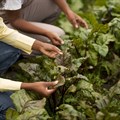The WWF has launched a new research report and tool, called the Great Food Puzzle, which identifies the highest-impact actions that can be taken country by country, based on their environmental and socioeconomic characteristics, to make our food system more sustainable.

Image: Supplied
The report highlights that food systems – the complex network of activities that involves the production, processing, transportation, and consumption of food – have major global impacts on nature and climate change, but they can only be made sustainable with local solutions.
Food system classifications
This new global study done across more than 100 countries classified them into six different Food System Types, based on their environmental and socioeconomic characteristics, and ranked the highest-impact actions in each.
The inclusion of environmental factors sets the study apart from other food system typologies, which is critical given the widespread impact the production of food has on nature and our total dependence on a functioning natural world.
Although there are some similarities across all Food System Types (named 1-6 to avoid biases or preconceptions), there are notable differences between priority actions in different Food System Types.
For instance, South Africa has been classified alongside Mexico, China, UAE and Spain, as having a food system that is already highly industrialised but also facing the highest levels of water risk especially in the light of climate change projections. High tech methods that can preserve access to clean and safe water are likely to be of great importance.
Critical common factor
While there is no single set of policy interventions that should be applied globally, the research revealed a consistent need across all countries to optimise land use and restore biodiversity, improve education and knowledge on healthy and sustainable diets, and to redesign financial subsidies and incentives.
There are many examples of countries already applying the highest-impact actions. Moving forward, the Great Food Puzzle approach will help to accelerate the incredible food system transformation that is already underway. By finding place-based solutions and building coalitions of actors who can learn from each other and share solutions and stories of success, we have the opportunity to create healthy and sustainable food systems for all.
Andy du Plessis, FoodForward SA 10 Sep 2024
After using the Great Food Puzzle to identify the high-priority, high-impact actions in different places, WWF can support implementation through its suite of additional solutions and tools for farmers, policymakers, businesses and consumers and physical presence in over 100 countries.
Importance of engaging locals
Mkhululi Silandela, systems change lead with WWF South Africa, said: “What this comprehensive study confirms is that transformation plans must be rooted in local cultures and context and built with multi-stakeholder approaches. It is within our power to create a healthier and more sustainable food system, especially if we focus on production, consumption and food loss and waste at multiple levels of society.”
Brent Loken, global food lead scientist, WWF said: “Food systems are extremely complex and are shaped by lots of factors including cultural heritage, values and local contexts. That means there are no silver bullets that will work everywhere and reverse the devastating impact that current food systems have on nature and human health. The Great Food Puzzle approach helps all stakeholders to identify science-based actions based on local context, or place-based solutions, that will deliver the biggest wins for people and planet in the shortest time.”













































